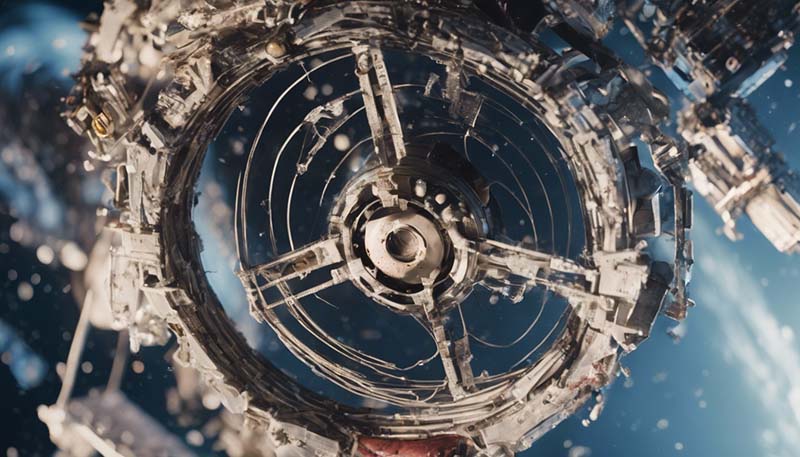Space Debris Mitigation: International Cooperation
Space Debris Mitigation: International Cooperation
Space debris, also known as space junk, refers to the millions of man-made objects orbiting the Earth at various altitudes. These objects include defunct satellites, spent rocket stages, and fragments from disintegration or collisions. The increasing amount of space debris poses a significant threat to the safety, sustainability, and accessibility of outer space for future generations. This article discusses the importance of international cooperation in mitigating space debris and ensuring the long-term use of space for all nations.
The Problem of Space Debris
The issue of space debris is multifaceted, with several key challenges:
- Collision Risk: The risk of collisions between operational spacecraft and debris is increasing, which can lead to a cascade of debris known as the Kessler Syndrome.
- End-of-Life Disposal: Many satellites and rocket bodies are not disposed of properly at the end of their operational life, leaving them as potential hazards.
- Space Environment: The space environment is becoming more congested, making it harder to navigate and increasing the risk of collisions.
- Legal and Policy Challenges: There is a lack of universally agreed-upon guidelines and regulations for the mitigation of space debris.
International Efforts and Guidelines
Recognizing the global nature of the space debris problem, several international efforts have been initiated to address the issue:
Advertisement
- United Nations: The UN has established the Committee on the Peaceful Uses of Outer Space (COPUOS) to promote international cooperation in space debris mitigation.
- International Space Debris Mitigation Guidelines: These guidelines, endorsed by various space agencies, provide recommendations for the design, manufacture, and operational practices to minimize the generation of debris.
- Inter-Agency Space Debris Coordination Committee (IADC): The IADC is a group of space agencies that work together to address the technical aspects of space debris.
National and Industry Initiatives
Individual nations and the space industry are also taking steps to mitigate space debris:
- National Space Policies: Many countries have developed national policies that include guidelines for the reduction of space debris.
- Spacecraft Design: New spacecraft are being designed with features such as end-of-life deorbit capabilities and the use of materials that burn up upon reentry.
- Space Traffic Management: Efforts are being made to develop better tracking and cataloging systems to monitor and manage the space environment.
The Role of International Cooperation
International cooperation is essential for effective space debris mitigation because:
- Shared Resources: Space is a shared global resource, and its preservation is a collective responsibility.
- Global Impact: The consequences of space debris collisions can affect all nations, regardless of where the debris originated.
- Inclusive Solutions: Engaging a diverse range of stakeholders, including developing countries, ensures that solutions are equitable and beneficial for all.
- Harmonized Approaches:统一的方法可以避免法规冲突,促进技术交流和知识共享。
Challenges to International Cooperation
Despite the recognized need for international cooperation, several challenges remain:
- Sovereignty Concerns: Some nations may be reluctant to share information or cooperate due to concerns over national security and sovereignty.
- Economic Interests: There may be conflicts between commercial interests and the need for sustainable space activities.
- Technological Disparities: Differences in the technological capabilities of various countries can create imbalances in the ability to contribute to and benefit from mitigation efforts.
- Legal and Regulatory Gaps: There is a need for a comprehensive legal framework that addresses the full spectrum of space debris issues.
Moving Forward
For international cooperation to be effective in mitigating space debris, several steps should be taken:

- Enhanced Dialogue: Regular dialogue among nations and stakeholders is necessary to build trust and understanding.
- Capacity Building: Assisting developing countries in building their capabilities to participate in space debris mitigation efforts.
- Common Goals and Standards: Establishing common goals and standards can help harmonize efforts and reduce conflicts.
- Public-Private Partnerships: Engaging the private sector can leverage additional resources and expertise in addressing space debris.
- Education and Outreach: Raising awareness about the importance of space debris mitigation among the public and policymakers.
Conclusion
Space debris mitigation is a complex, global challenge that requires a coordinated international response. By working together, the international community can develop and implement effective strategies to protect outer space for present and future generations. The long-term sustainability of space activities depends on our collective ability to address the space debris issue responsibly and collaboratively.
Author's Note: This article is a work of original content created for demonstration purposes and does not represent the views of any specific organization or entity.
Comments